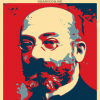Сообщений: 3
Язык: English
Frakseno (Показать профиль) 3 апреля 2008 г., 16:14:39
I was wondering whether folks here knew about the game/ad campaign McDonald's was running for the Beijing Olympics.
It's an "alternate reality" game called "Lost Ring."
I mention it here because it has one small Esperanto overlap:
It's an "alternate reality" game called "Lost Ring."
I mention it here because it has one small Esperanto overlap:
From an article in the New York Times:It seems that once again, Esperanto is being used within a fictional context to represent a neutral, "alien" or mysterious language. Similar to its use in the Lonelygirl15 videos, Gattaca, Blade III, and probably some I've missed.
The game began with 50 bloggers receiving packages with an Olympic-themed poster and a clue pointing them to TheLostRing.com. The site presented a dramatic trailer, replete with sci-fi lighting and a narrator with a British-accented baritone speaking over scenes of a woman waking up in a field with “Trovu la ringon perditan” — an Esperanto phrase — tattooed on her arm.
Hikaro (Показать профиль) 4 апреля 2008 г., 5:15:03
I love the Lost Ring! I've been pretty active in it since I saw a link to it in an earlier thread here on the English forum.
And actually, Esperanto has taken a much bigger role (though still not up to the role of the other languages involved). Around the 1920s, characters in the game wrote "La Kodekso de la Ringon Perditan" (The Codex of the Lost Ring), a 27 chapter Esperanto document that is IMMENSELY important to figuring out what's going on in the game. Each chapter is hidden somewhere different than the last, and a lot of the work we are doing right now is finding those chapters.
The characters who wrote the Codex (who are travelers from an alternate universe) said this:
I'd definitely encourage Esperantists to play, because the game is multilingual (having at least one interactive character speak each of the following languages: English, German, Spanish, French, Portuguese, Japanese, and Chinese; not to mention Esperanto's role) and is very much in harmony with Esperantist goals like international cooperation, language neutrality, etc. Not to mention that we could definitely use more translators, especially experienced Esperantists. I've been doing translating work into English but am definitely fairly low on the totem pole.
~Hikaro
And actually, Esperanto has taken a much bigger role (though still not up to the role of the other languages involved). Around the 1920s, characters in the game wrote "La Kodekso de la Ringon Perditan" (The Codex of the Lost Ring), a 27 chapter Esperanto document that is IMMENSELY important to figuring out what's going on in the game. Each chapter is hidden somewhere different than the last, and a lot of the work we are doing right now is finding those chapters.
The characters who wrote the Codex (who are travelers from an alternate universe) said this:
Ni elektis la lingvon Esperanto por ĉi tiu teksto pro la malfacilaĵoj kiuj ni havis komuniki unu kun la alia. Ni estas kuraĝigitaj per la invento de universala lingvo kaj celas, kiam ni revenas hejmen, verki niajn proprajn versiojn de la granda verko de Szmurlo. Kun iom da bonŝanco, jam kiam vi legas ĉi tion, Esperanto estos estiĝinta dua lingvo por ĉiuj universalaj vojaĝantoj.Here's the translation, done by thebruce on the Lost Ring Wiki
We chose the language Esperanto for this text because of the difficulties we had communicating with each other. We are encouraged by the invention of a universal language, and intend, when we come back home, to write our own versions of the great work of Szmurlo. With a bit of good luck, by the time you read this, Esperanto will have become a second language for all universal travelers.Because the Olympics (The International Olympic Committee is a co-sponsor) and Esperanto share ideals, it's being used for reasons Zamenhof would be proud of: linguistic neutrality and universal communication, not for its mysterious or alien sound.
I'd definitely encourage Esperantists to play, because the game is multilingual (having at least one interactive character speak each of the following languages: English, German, Spanish, French, Portuguese, Japanese, and Chinese; not to mention Esperanto's role) and is very much in harmony with Esperantist goals like international cooperation, language neutrality, etc. Not to mention that we could definitely use more translators, especially experienced Esperantists. I've been doing translating work into English but am definitely fairly low on the totem pole.
~Hikaro
Frakseno (Показать профиль) 4 апреля 2008 г., 15:53:25
Thanks for the additional information and context, Hikaro!
It does sound interesting, and I'm always glad to see La Lingvo Internacia popping up in new places accurately reflecting its goals.
It does sound interesting, and I'm always glad to see La Lingvo Internacia popping up in new places accurately reflecting its goals.

